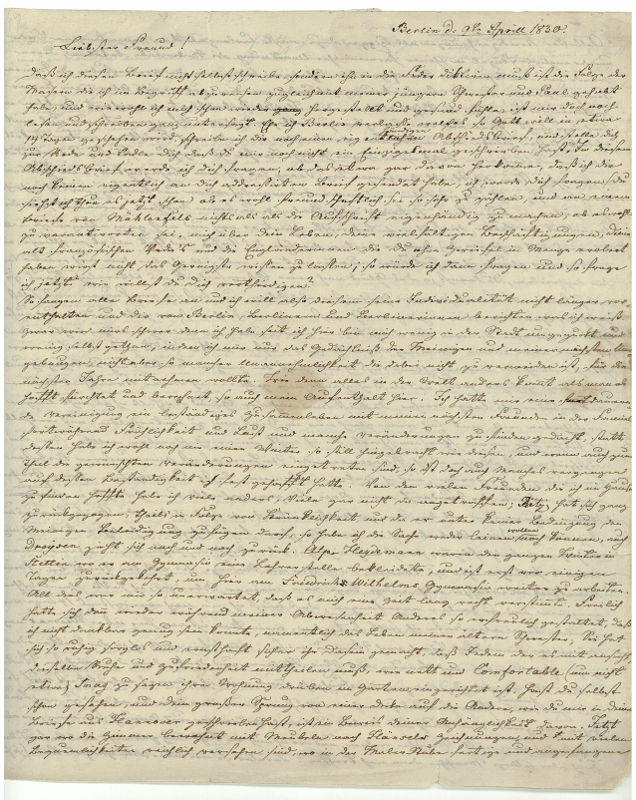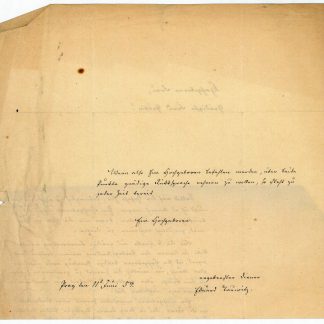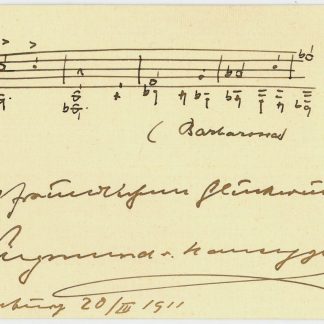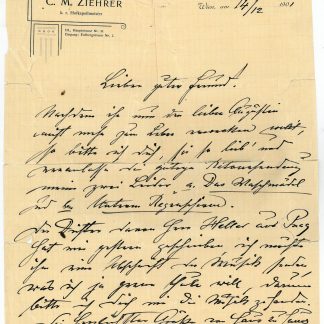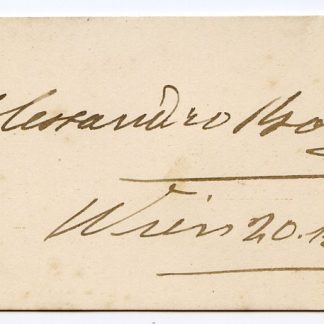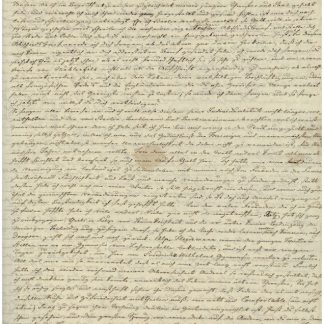Letter signed ("F MB").
4to. 4 pp. on bifolium.
€ 12,500.00
Via Carl Klingemann to the German Orientalist Friedrich Rosen (1805-1837) in London, sharing his observations on the cold and malicious nature of the Berliners. The composer laments about the way the denizens seem to make it a point to treat the artists poorly during performances: "On the Festival you already know the details from Klingemann; it has become one of our dearest recollections, and I think it is my best composition. A few weeks later the surgeon declared my knee to be completely cured, and I thought I would be leaving shortly, but then the bitter cold came and I postponed the journey and began a large work (a symphony for orchestra, on which I worked a lot every day; it isn't quite finished, but I hope I can finish it before my departure, as I have already begun the last movement. My illness surprised me a few days before my departure, I had already taken my leave and had started to pack; now I'll have to postpone that at least a fortnight longer, but then I think I can leave; my plan is to go from here via Weimar to Munich, then through the Tyrol to Vienna; from Vienna I intend to go to Venice and Upper Italy in the middle or toward the end of summer, and then I think I'll spend next winter in Rome and Naples, then in the spring, if it is permitted to spend so much time on a plan, go to Paris and then to London from time to time, where there may be much smoke and fog and great crowds and poverty, but where pretty nice people live, too, and where I wasn't so bad off for a year. But will I find the same people there then? On this, as on your whole Let (that is Sanscrit for the future) I ask you to let [me] know a lot, also about everything which is dear and precious to me in London, and about our friends at some length. For you have a sharp eye, professor, and when you are sitting on the blue sofa, or silently making tea, or modestly gliding to and fro in the halls of the university with a light red [folder] and a long black robe, you will still make your accurate remarks and comments, and I expect more from you than from many a Berlin lady. What I have to tell you about Berlin, at last, is little and not pleasant, the people are cold, malicious, and make it a point of honor never to be content; even when [Henriette] Sonntag performed recently she was received quite coldly and was palpably slighted in favor of the others in the cast; her sister, who performed the next evening, was almost completely hissed from the stage, for which the other faction took revenge, and in their first scene (in Othello), all the participants were hissed at and Mme. Sonntag had a curtain call, and at that they speak, think, and do nothing differently than Mme. Sonntag and the factions for and against her. But is such formation of factions something a reasonable and interested public should do and doesn't it spoil any enjoyment of the work of art and all joy of the artist? But that's how they are in big and little things, and the Flower Market that opened yesterday in the University Gardens, for which a single gardener has obtained a monopoly, is just as good a proof of it as the dearth of operas other than by Spontini and Auber for which the Royal Theater has in turn obtained a monopoly, and like the monotony of the parties and conversations here; God will improve this when He has nothing to do but that, but I'm afraid He'll get other things and so much to reform that the Berliners' turn won't come for a long time, so for now they are good enough. Let me know what the Johnstons are doing, whether Ritter is still the same as back then, and whether Mühlenfels has been successfully introduced to society and speaks French with Federita. Let me know, too, about the stone monkeys, the wooden chairs from King Edmund the Cannibal's time, and the scraped-off portraits. My chests from England arrived a few days ago and filled me with longing again. Have you been back to Atwood's again since then, and did you entertain the fellow with some Ikojan Atchi? You see how I have learned from you. In short, write me about each and every thing, but especially, write me [...]" (transl.).
Friedrich Rosen became Professor of Sanscrit at the University of London (later University College) in 1827, at the age of twenty-two. Carl Klingemann was Mendelssohn's close friend and collaborator who wrote the words for many of the composer's songs. Karl Wilhelm Ludwig Heyse had been Mendelssohn's tutor until 1827. The Festival is possibly the Grosse Festmusik zum Dareifest (Grand Festive Music for the Durer Celebration) of 1828. The Symphony may be the Fingal's Cave Overture written in 1830. One of the Liechtenstein songs is doubtless Frühlingslied (Song of Spring), op. 19, no. 1.

